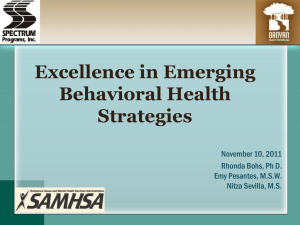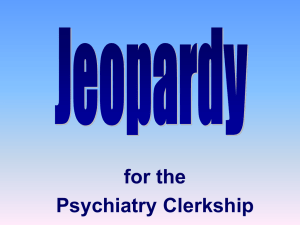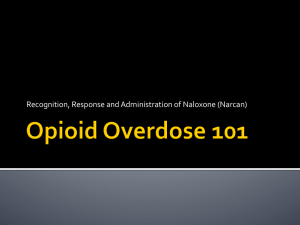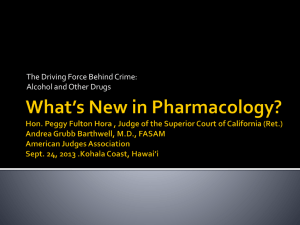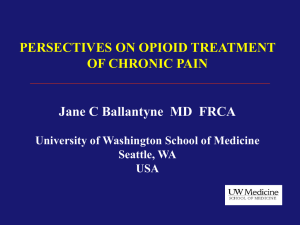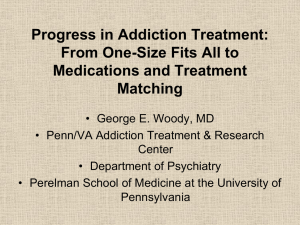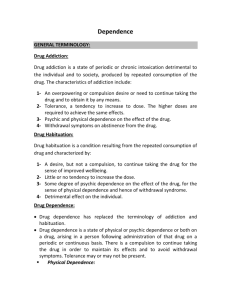FAQ vivitrol.5.29.15 - MidWest Clinicians` Network
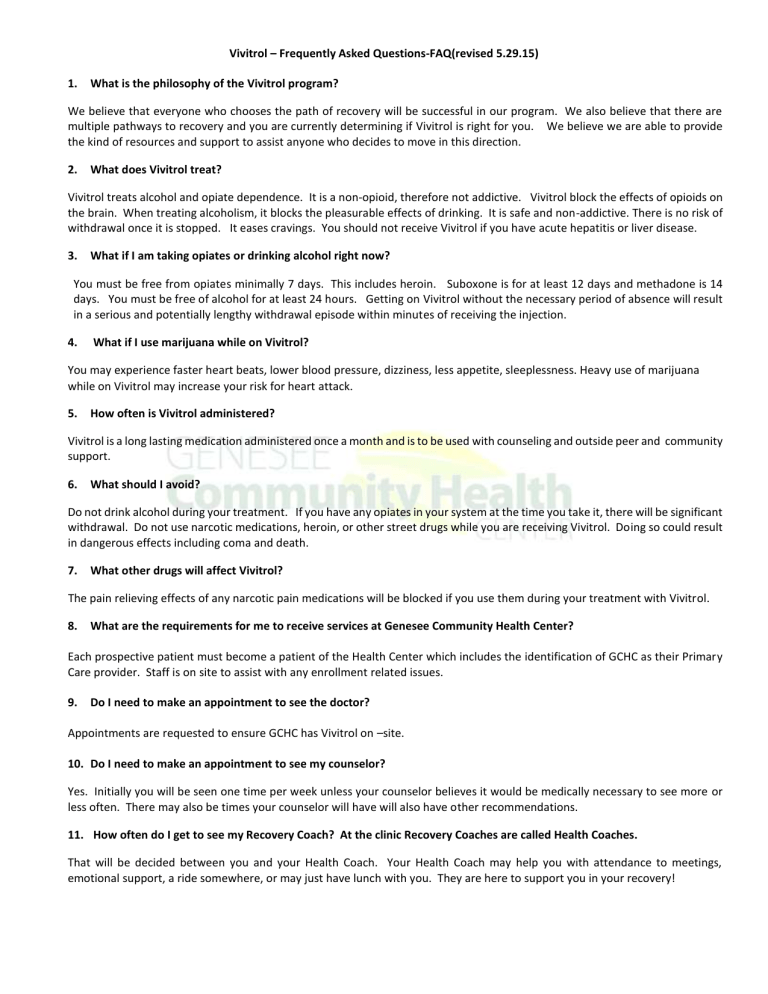
Vivitrol – Frequently Asked Questions-FAQ(revised 5.29.15)
1.
What is the philosophy of the Vivitrol program?
We believe that everyone who chooses the path of recovery will be successful in our program. We also believe that there are multiple pathways to recovery and you are currently determining if Vivitrol is right for you. We believe we are able to provide the kind of resources and support to assist anyone who decides to move in this direction.
2.
What does Vivitrol treat?
Vivitrol treats alcohol and opiate dependence. It is a non-opioid, therefore not addictive. Vivitrol block the effects of opioids on the brain. When treating alcoholism, it blocks the pleasurable effects of drinking. It is safe and non-addictive. There is no risk of withdrawal once it is stopped. It eases cravings. You should not receive Vivitrol if you have acute hepatitis or liver disease.
3.
What if I am taking opiates or drinking alcohol right now?
You must be free from opiates minimally 7 days. This includes heroin. Suboxone is for at least 12 days and methadone is 14 days. You must be free of alcohol for at least 24 hours. Getting on Vivitrol without the necessary period of absence will result in a serious and potentially lengthy withdrawal episode within minutes of receiving the injection.
4.
What if I use marijuana while on Vivitrol?
You may experience faster heart beats, lower blood pressure, dizziness, less appetite, sleeplessness. Heavy use of marijuana while on Vivitrol may increase your risk for heart attack.
5.
How often is Vivitrol administered?
Vivitrol is a long lasting medication administered once a month and is to be used with counseling and outside peer and community support.
6.
What should I avoid?
Do not drink alcohol during your treatment. If you have any opiates in your system at the time you take it, there will be significant withdrawal. Do not use narcotic medications, heroin, or other street drugs while you are receiving Vivitrol. Doing so could result in dangerous effects including coma and death.
7.
What other drugs will affect Vivitrol?
The pain relieving effects of any narcotic pain medications will be blocked if you use them during your treatment with Vivitrol.
8.
What are the requirements for me to receive services at Genesee Community Health Center?
Each prospective patient must become a patient of the Health Center which includes the identification of GCHC as their Primary
Care provider. Staff is on site to assist with any enrollment related issues.
9.
Do I need to make an appointment to see the doctor?
Appointments are requested to ensure GCHC has Vivitrol on –site.
10.
Do I need to make an appointment to see my counselor?
Yes. Initially you will be seen one time per week unless your counselor believes it would be medically necessary to see more or less often. There may also be times your counselor will have will also have other recommendations.
11.
How often do I get to see my Recovery Coach? At the clinic Recovery Coaches are called Health Coaches.
That will be decided between you and your Health Coach. Your Health Coach may help you with attendance to meetings, emotional support, a ride somewhere, or may just have lunch with you. They are here to support you in your recovery!
12.
Who pays for me to receive treatment?
Most people coming into the clinic are eligible for Medicaid or have some other type of insurance that will cover the cost of services you receive.
13.
How long should I expect to be on Vivitrol?
This will vary, however, expect anywhere from 12-24 months. There are always exceptions to this time frame.
14.
How do I get started?
If you decide this is the pathway for your recovery at this time, and you decide to identify the Health Center as your primary care provider, you could potentially begin treatment today.
15.
What happens if I use other substances while in treatment?
Every effort will be made to identify ways for you to remain free of substances while you are receiving services. Ultimately, you as the patient are responsible for your recovery. However, you may be discharged from the program if you use or relapse occurs.
16.
What if I am pregnant?
Each female who become pregnant during the course of treatment must tell the doctor.
17.
What if I take drugs or alcohol during my course of treatment?
You are responsible to inform either the Nurse Practitioner, Doctor, Counselor, or Health Coach if this occurs
If you have previously used opioids, you may be sensitive to lower doses of opioids after receiving Vivitrol and are at risk for accidental overdose if you use opioids when your next Vivitrol is due, if you miss a dose, or if Vivitrol is discontinued.
You will not feel the effects of heroin and opioids in small doses. Taking big amounts of heroin or opioids to bypass the effects of Vivitrol may lead to serious injury, death or coma.
18.
What other symptoms should I expect?
You may have tenderness, swelling, bruising or itching at the site of injection. However, if you develop more serious skin reaction, please contact us.
You may experience depression while on Vivitrol. Vivitrol may cause allergic pneumonia. Those symptom include cough, wheezing, fever, shortness of breath.
You may have an allergic reaction such as hives, itching, shortness of breath, swollen lips or even nausea after your first injection.
Other common side effects include: tiredness, headache, vomiting, decreased appetite, insomnia, dizziness, painful joints and muscle cramps.
What if I have an emergency?
Please contact 496-5777- press option 6. You will leave a voicemail and your call will be returned.

